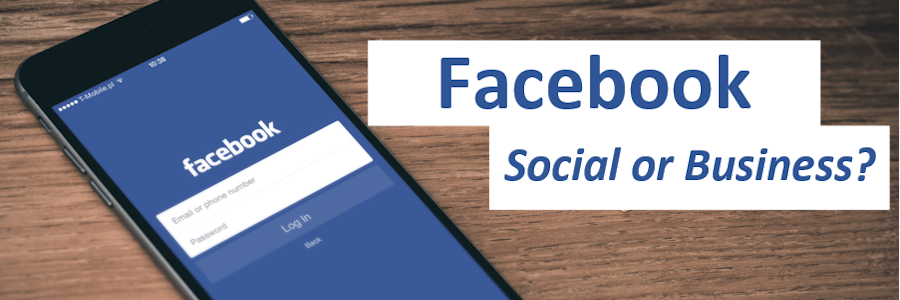If you’re in business and you’re not using social media to create and maintain visibility, you’re missing a trick! However, which social media should you be active on?
People call online networks ‘social media’, but does that mean it’s not business? No – perhaps it should have been called ‘networking media’. Many people think LinkedIn is more of a business platform, than a social environment (and it is), but there’s a lot of discussion about whether Facebook is a business platform or not. I think that, if you’re selling business-to-consumer (B2C) Facebook is a great place to do business, but that doesn’t mean that businesses that are selling to other businesses (B2B) should ignore it.
Get the focus right
People on Facebook tend to be in social ‘headspace’. In other words they’re thinking about leisure, family, friends, hobbies, interests – even if they’re the MD of a big organisation.
People do buy things on Facebook – they spend millions of dollars! However, they tend to be skewed towards, gifts, personal services (hair, beauty, therapy, personal trainer, etc.) handbags, shoes, sports kit, and personal development – so courses or training that will help the individual in some way.
People are less likely to buy business equipment or services – but that doesn’t mean they don’t look at them at all. It’s just not their primary focus.
What will a Facebook Page do for you?
Originally Facebook created Fan pages for people, brands and companies that wanted to grow a following. They were (and are) great for speakers, musicians, artists, and personal services (hairdressers, make-up artists, personal trainers, dieticians), but other companies quickly realised there was an opportunity and started using them to create communities around specific products or brands.
These are now known simply as ‘Pages’ and you can have more than one – but, for them to be successful, you need to put in the effort to build your following and maintain it.
Big organisations use them as a way to communicate directly with their customers – and most of the big brands (mobile phone companies, food and drinks manufacturers, etc) have Facebook Pages to allow them to interact with their customers – something that they don’t do on their corporate websites.
I think a Facebook Page has many advantages – but you do need to think about why you have one (or want to create one) – and what you expect to achieve with it.
If it’s just about keeping your head above the parapet then all you need to do is to post a few times a week. If you want something more you may need to work harder to develop your following and promote your products or services.
Think about what you want your Page to be or do. It could
- Create a community with conversations
- Provide an opportunity to share your expertise
- Promote your products, services, training, events.
- Be a means of reaching more people who match your target market profile
- Be a forum to talk directly to your customers, answer questions, deal with problems, etc.
Making it work
Bunging in the occasional post won’t cut it – you need a proper plan of action.
- What subject matter will you cover?
- Will you have themes for a week or month or just post anything that seems appropriate?
- How frequently will you post?
- Who will be responsible for posting?
- What kind of images will attract your audience?
- How do you get a big enough audience to get traction?
- What kind of material will interest your audience?
- Video is popular – and attracts views – can you use this effectively?
- Will you grow your page organically or through Facebook ads or boosted posts?
Do your planning first and your Page will have a much better chance of delivering good results, but it will take time.

